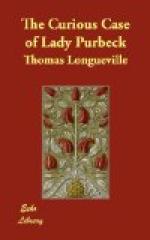It is clear, therefore, that when they became Catholics Sir Robert Howard and Lady Purbeck must have determined never to resume their illicit intercourse; and, so far as is known, they never did so. In a letter to Secretary Windebanke written from Paris, in July, 1636, Lord Scudamore, after saying something about Lady Purbeck, adds: “She expects every day Sir Robert Howard here:” but this must have been mere gossip, for Scudamore cannot have been in the confidence of that fugitive from England, Lady Purbeck, as he was English Ambassador at Paris; moreover, he was a particular ally of Archbishop Laud,[93] therefore, not likely to have relations with an escaped prisoner of Laud’s; although, as we shall presently find, another, although very different, friend of Laud took her part. Nor is there anything to show that Sir Robert Howard went to Paris.
Respecting the matter of Sir Robert’s submission to the Catholic Church, the Reverend Mr. Garrard was perfectly right in saying: “Let him go to that Church for absolution, for comfort he can find none in ours.” Whether the Catholic religion is the worst of religions or the best of religions, it is the religion to which those in grievous trouble, whether through misfortune or their own fault, most frequently have recourse; a religion which offers salvation and solace even to the adulterer, the thief, the murderer, or the perpetrator of any other crimes, on condition of contrition and firm purpose of amendment.[94]
FOOTNOTES:
[87] History of the Troubles and Tryal of Archbishop Laud (ed. 1695), p. 146.
[88] Vol. I., p. 390, 17th March, 1635.
[89] Strafford Papers, Vol. I., p. 447. Letter from Garrard to the Lord Deputy, dated 30th July, 1635.
[90] Lingard, Vol. VII., Chap. V.
[91] Strafford Letters, Vol. I., p. 434.
[92] Ibid., Vol. II., p. 72.
[93] “The remarkably studious, pious, and hospitable life he led, made him respected & esteemed by all good men, especially by Laud, who generally visited him in going to & from his Diocese of St. David’s & found his entertainment as kind and full of respect as ever he did from any friend” (Burke’s Dormant and Extinct Peerages, p. 483).
[94] In Coles’ MSS., Vol. XXXIII., p. 17, may be found the following note, after a mention of Lady Purbeck: “Sir Robert Howard died April 22, 1653, and was buried at Clunn in Shropshire, leaving issue by Catherine Nevill, his Wife, 3 sons, who, I presume, he married after the Lady Purbeck’s death which happened 8 years before his own. The Epitaph in my Book in Folio of Lichfield, lent me by Mr. Mitton. Sir Robert was 5th Son to Thomas, Earl of Suffolk, Lord Treasurer of England.”
CHAPTER XII.
“O
must the wretched exile ever mourn,
Nor
after length of rolling years return?”
DRYDEN.




